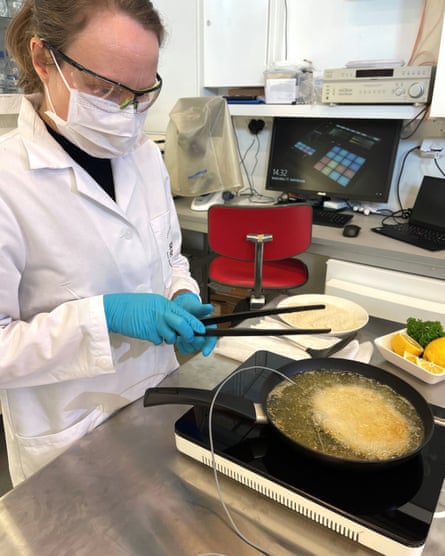Last week, Singapore became the first country to approve the commercial sale of a protein grown “out of thin air”, according to its marketing tagline. Solein, a yellow powder resembling grated parmesan, is the product of microbes that are fed gases – carbon dioxide, hydrogen and oxygen – and nutrients. According to its developer, the Finnish company Solar Foods, it will be used in products such as plant-based meats, breads and spreads.
Singapore has emerged as a global hotspot for the alternative protein industry, with startups flocking to the island to develop and launch animal-free alternatives to traditional meat products.
The world’s leading food industry players converged on the city-state last week for the Asia-Pacific agri-food innovation summit, where several dozen startups and thinktanks agreed to henceforth refer to lab-grown meat – also known as cellular agriculture – as “cultivated meat”.
Mirte Gosker, managing director of the thinktank Good Food Institute (GFI) Asia-Pacific, says Singapore is “without question the leading alternative protein hub in Asia – and arguably the world”. According to the institute, there are now at least 36 alternative protein companies based in the city, which have collectively raised more than US$213m in funding.
Along with Israel, Singapore’s government has been the “most vocal and active in their support for alternative proteins” globally, GFI has found, and it has invested significantly in startup and infrastructure funds.
Singapore is the first country to have approved the commercial sale of cultivated meat, in the form of chicken nuggets and chicken breast produced by Good Meat, a subsidiary of the American firm Eat Just. At the COP27 summit that begins in Egypt on Sunday, Singapore’s pavilion will be dishing out samples of the cultivated meat.
How Singapore became a food-tech hub
Singapore’s rise in the alternative protein sector is partly driven by geography. The island spans a little more than 700 sq km – and less than 1% of that area is farmland.
Prof William Chen, director of the food science and technology program at the Nanyang Technological University, says Singapore relies on imports for more than 90% of its food, which leaves it vulnerable to shortages and price inflation.
“In peacetime, we import food from more than 170 countries,” Chen says.
The government has been considering food security since 2014, he says, particularly in light of the “looming crisis” of climate change.
The government has set a “30 by 30” strategy – a target of producing 30% of its nutritional needs locally and sustainably by 2030.
The strategy focuses on increasing the production of fruit, vegetables and eggs, but the government has also invested in alternative proteins in anticipation of future demand. Food demand is expected to increase globally by at least 59% between 2005 and 2050, when the UN predicts the global population will hit 9.7 billion.
Prof Michelle Colgrave, who leads the Future Protein Mission at the CSIRO, the Australian government’s science agency, says increasing urbanisation and affluence in parts of Asia and Africa will lead to a rising demand for protein, and particularly animal-derived proteins.
“At the same time, to address a looming food gap, we need to have these complementary sources of protein … from plant-based through to cell-based,” she says.
Gosker says Singapore is the only country where “all three pillars of alternative proteins” – plant-based, fermentation-enabled and cultivated – are sold commercially.
Plant-based products, the most widely available, have yet to achieve price parity with conventional meat, Gosker says. They comprise proteins from wheat, soy, pea and pulses, as well as from algae, such as spirulina.
Susie O’Neill, head of industry engagement at the thinktank Food Frontier, says there are at least 17 international manufacturers selling plant-based protein products in Singapore, including Beyond Meat and Impossible. Asia-based startups include TiNDLE and OmniFoods.
In precision fermentation, single-celled organisms such as yeasts are used to produce a specific protein using a carbon source – such as sugars or, in the case of solein, gases – and nitrogen as key ingredients. The technique is being used by firms such as Perfect Day to make cow-free dairy proteins.
O’Neill points out a similar process has been used for decades to generate products such as non-animal rennet for cheese. “Also, insulin is produced in this way, and some vitamins such as B12,” she says.

Few farmers to object
Cultivated meat, which has been touted as an environmentally sustainable alternative to conventional animal meat, has yet to hit the mainstream. O’Neill estimates there are 11 cellular agriculture companies working in Singapore, including Shiok Meat, which is developing cultivated shrimp, crab and lobster, and Good Meat, of chicken nugget fame.
“An estimated 1,000 customers have been able to purchase [cultivated chicken] through a series of restaurant pop-ups and small-scale runs, but large-scale sales are still a way off,” Gosker says. Despite substantial price reductions – the first lab-grown burger cost $300,000 to produce in 2013 – critical research suggests cultivated meat may never be able to compete with conventional meat on price.
Chen, who was part of the regulatory board that approved the lab-grown chicken nuggets, says there is less resistance to new food sources in Singapore than in countries with large livestock industries, where the job of farmers and others in the meat supply chain might be at risk.
“If you develop plant-based or cultivated meat [in places like the US or Brazil], you’re bound to face resistance,” he says. “In Singapore, we don’t have this problem.”
Another advantage is that Singapore was already a tech hub.
“In the transition from biomedical technology to food technology development – you don’t have to reinvent the wheel,” Chen says. “Cultivated meat is very much another form of tissue engineering. Precision fermentation is another biological industry.”
Critics of alternative proteins have said their development could jeopardise the livelihoods of millions of food producers, and that investment shifts resources away from “desperately needed regionalisation of food production and processing”. Some have said the sector reinforces a “centre of the plate” approach to protein in diets, rather than “supporting transformational changes in the way we eat”.
Chen does not see alternative proteins as a threat to traditional meat producers. Novel proteins are unlikely to be a replacement for existing foods, but rather should provide “new options, so that we are better prepared for future food crises”, he says.
“It’s complementary.”
